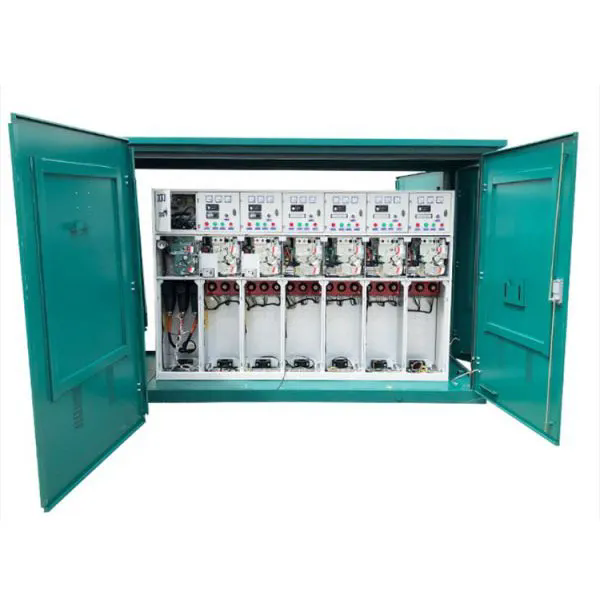Ring Main Units: Essential Components for Efficient Electrical Distribution
2024-09-04
In the realm of electrical distribution, ensuring reliability, safety, and efficiency is paramount. One of the key components that help achieve these goals is the Ring Main Unit (RMU). This blog delves into what a Ring Main Unit is, its advantages, and its applications, highlighting why it is a crucial element in modern electrical distribution systems.
What is a Ring Main Unit (RMU)?
A Ring Main Unit is a type of switchgear used in electrical distribution systems to manage and control the flow of electricity. It is designed to provide a flexible and reliable way to distribute electrical power to various loads within a network. RMUs are typically used in medium-voltage (MV) systems, usually operating between 1 kV and 36 kV.
Key Features of Ring Main Units
1. Modular Design
RMUs often feature a modular design, allowing for easy integration into existing systems and enabling future expansion. This flexibility is crucial for adapting to changing power distribution needs and ensuring long-term system viability.
2. Automatic and Manual Operation
Ring Main Units can be operated both manually and automatically. This dual functionality allows operators to control the unit via manual switches or automated systems, providing versatility in various operating conditions.
3. Fault Isolation
One of the primary functions of an RMU is to isolate faults in the electrical distribution system. By quickly identifying and isolating problematic sections, RMUs help maintain power supply continuity and protect the rest of the system from damage.
4. Circuit Protection
RMUs are equipped with various protection devices such as circuit breakers, fuses, and relays. These components safeguard the electrical network from overloads, short circuits, and other electrical faults, ensuring system reliability and safety.
5. Remote Monitoring and Control
Modern RMUs often come with advanced features for remote monitoring and control. This capability allows operators to manage the unit from a central location, enhancing system management and reducing the need for on-site intervention.
6. Compact Design
The compact design of RMUs makes them suitable for installation in space-constrained environments. Their small footprint allows for efficient use of available space while providing robust functionality.
Benefits of Ring Main Units
1. Enhanced Reliability
RMUs enhance the reliability of electrical distribution systems by providing multiple pathways for power flow. In the event of a fault, the RMU can isolate the affected section and maintain power supply to other parts of the network, minimizing downtime.
2. Improved Safety
The inclusion of protection devices and fault isolation mechanisms enhances the safety of both the electrical system and personnel. RMUs help prevent damage to equipment and reduce the risk of electrical hazards.
3. Flexibility and Scalability
The modular and adaptable design of RMUs allows for easy integration into existing systems and future scalability. This flexibility makes them suitable for a wide range of applications and evolving power distribution needs.
4. Efficient Maintenance
With features such as fault isolation and remote monitoring, RMUs facilitate efficient maintenance and quicker response to issues. This reduces the need for extensive manual intervention and helps maintain system performance.
5. Cost-Effective Operation
The reliability and efficiency provided by RMUs contribute to cost savings in the long run. By reducing downtime and maintenance requirements, RMUs offer a cost-effective solution for electrical distribution.
Applications of Ring Main Units
1. Urban Electrical Distribution
In urban areas, RMUs are commonly used to manage and distribute electrical power to residential and commercial buildings. Their compact design and reliable performance make them ideal for city infrastructure.
2. Industrial Facilities
RMUs play a crucial role in industrial facilities, where they manage power distribution to various machines and equipment. Their ability to handle high voltage and provide fault isolation is essential for maintaining industrial operations.
3. Utilities and Power Stations
In utility and power station environments, RMUs are used to control and distribute electricity from the generation source to the end-users. Their reliability and remote control capabilities are vital for effective power management.
4. Renewable Energy Systems
RMUs are increasingly being used in renewable energy systems, such as wind and solar power installations. They help manage the distribution of power generated from renewable sources, ensuring efficient and reliable operation.
5. Commercial Buildings
In commercial buildings, RMUs manage the distribution of electrical power to various sections, such as lighting, HVAC systems, and office equipment. Their compact design and reliability are well-suited for commercial applications.
Conclusion
Ring Main Units (RMUs) are integral components of modern electrical distribution systems, offering enhanced reliability, safety, and efficiency. Their modular design, fault isolation capabilities, and advanced features make them essential for managing and controlling electrical power in various applications. By understanding the features, benefits, and applications of RMUs, businesses and utilities can make informed decisions and ensure the efficient operation of their electrical systems. Embrace the advantages of Ring Main Units and enhance the performance and reliability of your electrical distribution network.



